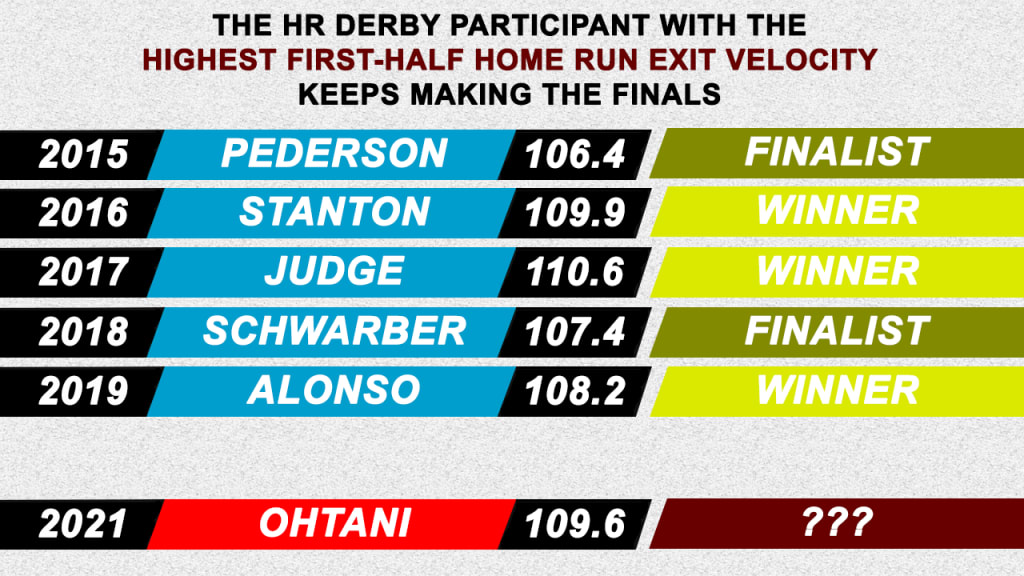Allow us to present a red-hot prediction ahead of Monday’s T-Mobile Home Run Derby in Denver: Shohei Ohtani is going to make it to the finals.
That’s not just because we want him to (we do), or because it would be an incredible capper on what’s already been one of the most amazing stories in baseball history (it would be). It’s because he does The One Magic Thing that has directed a player to the finals five consecutive times. It’s not complicated. It’s actually the simplest thing in the world.
It’s as easy as this: Of the eight finalists, Ohtani hits his home runs harder than anyone.
That’s it. That’s the trick.
Statcast came online in 2015, and we have had a Derby five times since. Five times in a row, all five times since 2015, the slugger who entered the break with the hardest-hit home runs has made it to the finals. Hit hard, crush dingers, make the finals. Simple as that.
Too simple, really, because generally we don’t use average exit velocity for much of anything. (Hard-hit rate is much preferred.) It was at least a little unexpected for such a blunt-force tool to have worked so often, and maybe we’ll look back upon this run as a fluke. So we looked at some other metrics, too, to see if anything worked better.
We tried first-half home runs per swing; it didn’t get us anywhere. We thought about hard-hit rate per swing or batted ball -- nah. Since about two-thirds of all homers are pulled, we tried highest rate of homers hit to the pull side, and while that did help us a bit when explaining the comparatively light-hitting Todd Frazier’s success in 2015 and ‘16, it didn’t do a lot elsewhere.
We figured something more scientific, like barrels per batted ball, would work, given that a barrel is the perfect combination of exit velocity and launch angle, and for the most part it did work, except that in 2018, Max Muncy came in as the leader and he lost to Bryce Harper in the semifinals. To our great surprise, so far, just hitting the homers as hard as you can has done the best. (Not that Ohtani doesn’t also have the best barrel rate anyway; he does.)
As you might expect, hitting your home runs the hardest in the first half of the season leads pretty consistently to hitting your home runs the hardest in the Home Run Derby, and in each of the last three seasons, the hardest-hitting Derby masher has made the finals. It’s fueled by technology that could be used in rocket science, but it’s not really rocket science. It’s the simple idea of blasting baseballs into the sun.
To show you what we mean, here’s how this went for the past five seasons where there has been a Derby.

That's a pretty stark run of success, and in more recent years, it's been even better than just that. In 2018, Schwarber entered the break with the hardest-hit homers and made it to the finals, where he fell to Bryce Harper, who had the second-hardest-hit homers that year. In 2019, Alonso reached the finals and faced off against Vladimir Guerrero Jr., who had the third-hardest-hit homers, but by hardly any gap at all (107.5 mph, as compared to the tie at the top between Alonso and Ronald Acuña Jr. at 108.2 mph).
In each of the last three years, the finals have been comprised entirely of hitters from the top half of the hard-hit homers list, since in 2017, Miguel Sanó, who lost to Judge, entered the Derby in fourth. If not for Frazier's skill at pulling everything to the shortest part of the field, we might have an endless run of this.
So far as 2021 goes, all eight of our sluggers hit their homers hard, obviously. They wouldn't be in the Derby otherwise. But it's Ohtani at the top, and something of a tie between Juan Soto and Joey Gallo for second place.
2021 home run exit velocity, among Derby participants
109.2 mph -- Shohei Ohtani, LAA
108.6 mph -- Juan Soto, WSH
107.6 mph -- Joey Gallo, TEX
106.8 mph -- Pete Alonso, NYM
106.1 mph -- Matt Olson, OAK
105.6 mph -- Trey Mancini, BAL
105.5 mph -- Salvador Perez, KC
103.9 mph -- Trevor Story, COL
A little bit of bracketology comes into play here, of course; Ohtani and Soto are slated to face off in the first round, meaning one of our top two sluggers will be knocked out right away. On the other hand, that also means that we know one of our two hardest-hitting sluggers is guaranteed to get out of the first round, too.
For Ohtani, it's not just about the exit velocity on home runs, though it's of course about that too. Think about all the other ways to measure his hard-hitting greatness, really. Who hits it harder in the air, which is basically the entire purpose of a Home Run Derby? Absolutely no one. Who has more of their plate appearances end in a barrel, which is a Statcast metric attempting to show the perfect combination of exit velocity and launch angle? Absolutely no one. Who hits the ball, any ball, hard more often? Only Perez, actually, but otherwise: no one. Who has the hardest-hit ball ever tracked by a left-handed batter? He does.
When we talk about Ohtani, we talk about all the incredible things he does, the fact that he's leading the Majors in home runs while also striking out a third of the batters he faces on the mound, the fact that he's an elite baserunner while also possessing the most dominating right-handed pitch on record. (No, really.) But those things, most of them, are irrelevant in a Home Run Derby. It's possible that thinking about the entirety of the Ohtani experience perhaps obscures the simple fact that he's one of the truly spectacular power hitters in the game, full stop. He does the one thing that has tended to lead to Derby victories better than anyone else.
As though his story isn't incredible enough, just imagine how it's going to feel on Tuesday when he starts at DH in the All-Star Game carrying a Home Run Derby title along with him. Probably, anyway.
